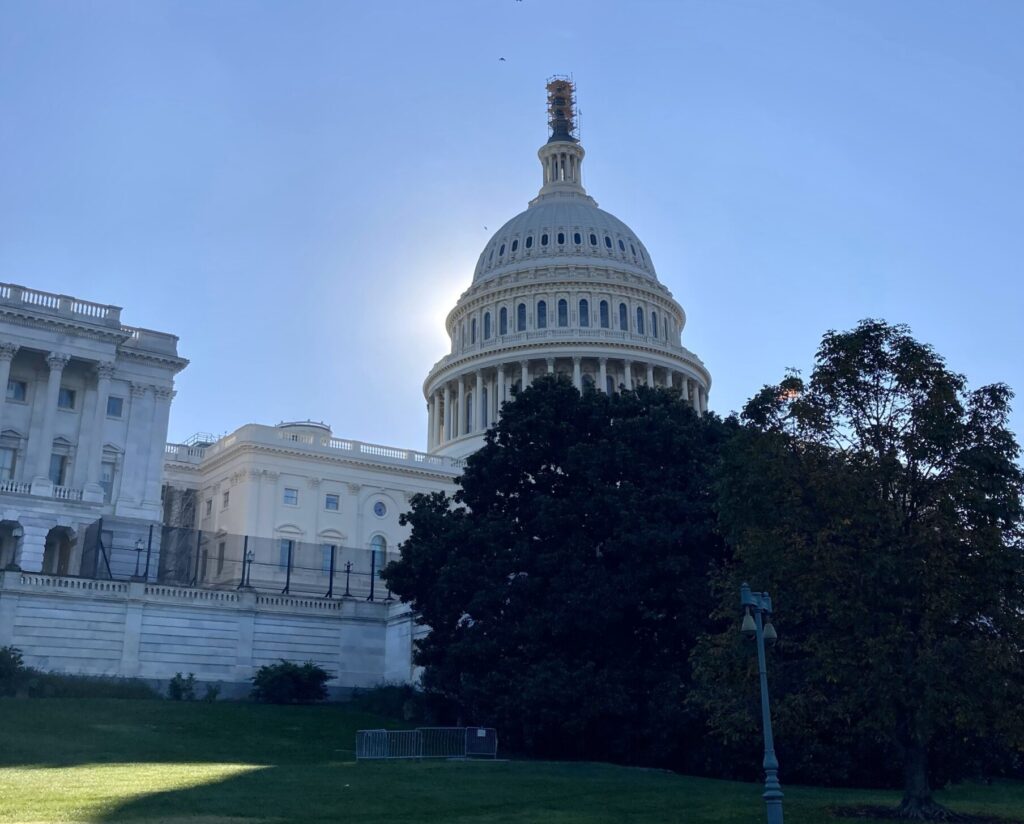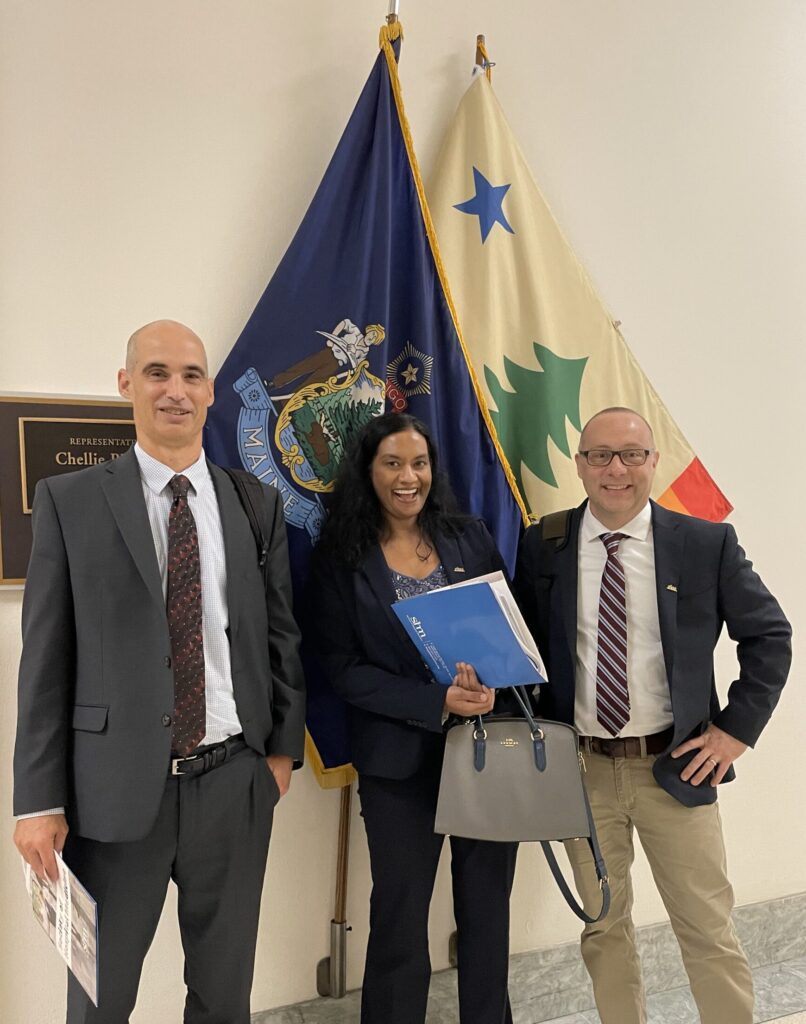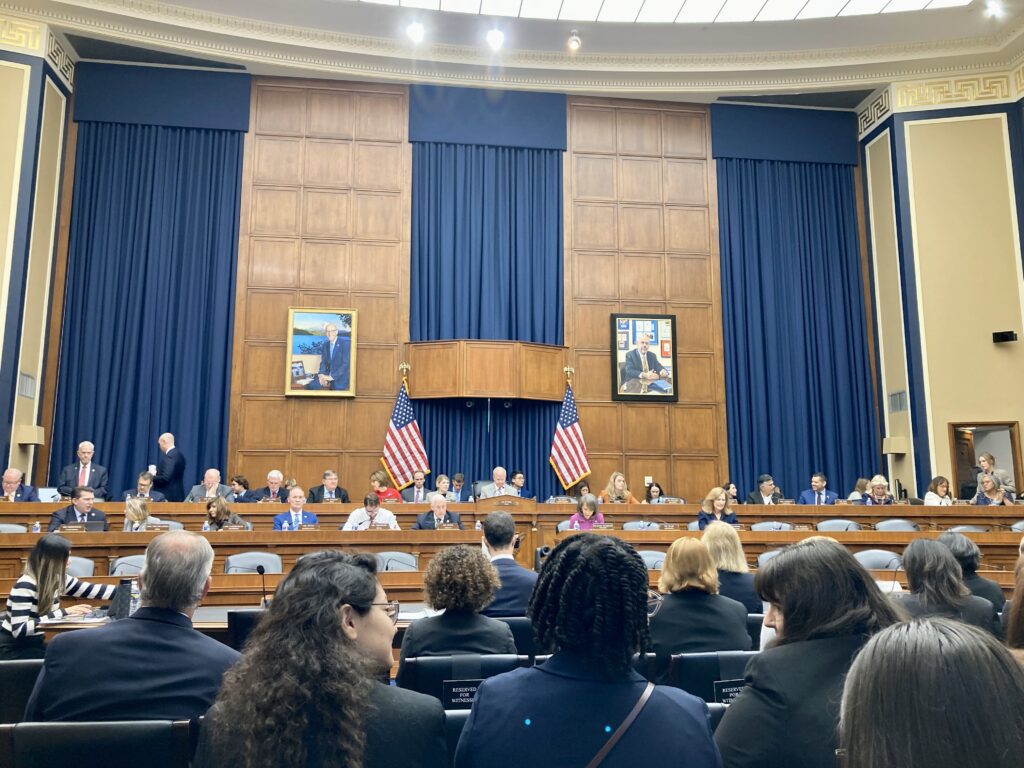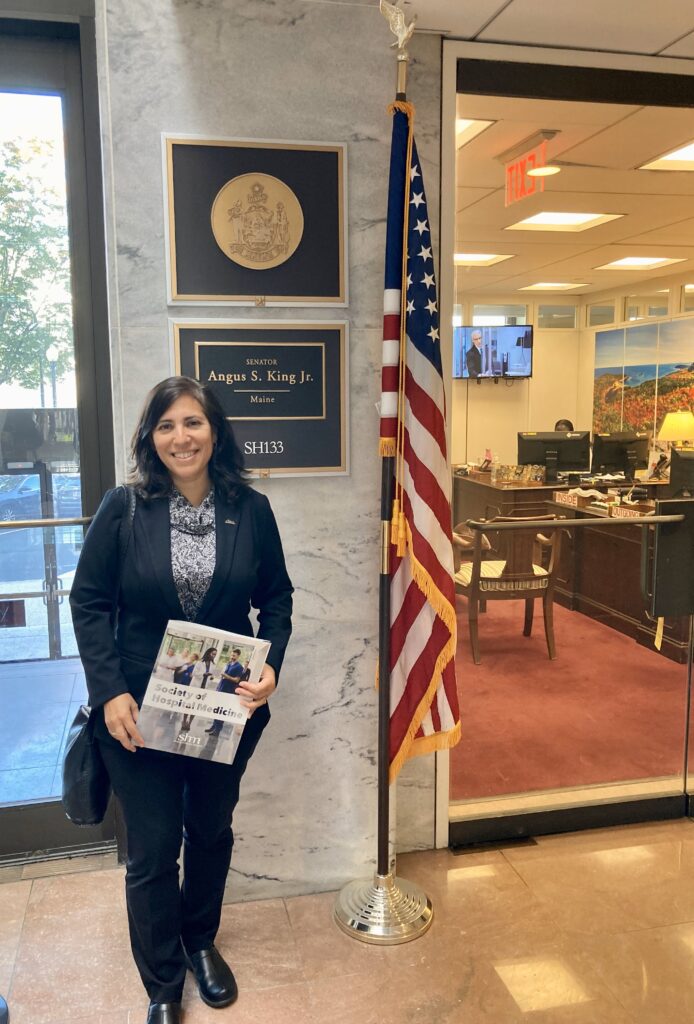
U.S. Capitol, SHM Hill Day 2023
Each year SHM members and staff converge in Washington, D.C., to meet with legislators and discuss key concerns and policy issues that affect hospitalists, their patients, and the health care industry.
On October 19, 2023, members from 16 states, including SHM’s Public Policy Committee (PPC) and chapters, attended SHM’s Hill Day. Having chapter members in attendance this year was a boon in that it “allowed the group access to some state offices that historically we haven’t had a relationship with; it expanded our reach on the Hill,” said Rick Hilger, MD, SFHM, SHM PPC chair, and the system utilization and care management medical director at HealthPartners in Minneapolis.

L to R: Dr. Rick Hilger, Dr. Suparna Dutta, and SHM’s chief legal office, Josh Boswell
The group spent the day meeting with their Congressional offices, and in some cases, directly with their Representatives. During these meetings, attendees educated staffers about the role of a hospitalist and the importance of hospital medicine. They visited 43 different offices, and many got a chance to attend a House Committee on Energy and Commerce Health Legislative Hearing: “What’s the Prognosis?: Examining Medicare Proposals to Improve Patient Access to Care & Minimize Red Tape for Doctors” in which the new director of the Centers for Medicare and Medicaid Services (CMS), Dr. Meena Seshamani, was testifying.

U.S. House Committee on Energy and Commerce Health Legislative Hearing
“It was fascinating and super encouraging,” said Claudia Geyer, MD, SFHM, system chief of hospital medicine and the hospital medicine fellowship at Central Maine Healthcare in Lewiston, Maine. “It was clear there was bipartisan understanding of many of the things that are most difficult for us in terms of provision of care, prior authorizations, access to care, payment. Both parties agreed we need to fix these things for doctors and patients. I was pleasantly surprised by that, honestly.”
Dr. Geyer attended her first Hill Day in 2019. And, while gun violence wasn’t on the agenda this year, the recent mass casualties in Lewiston made her even more aware of the importance of advocacy.
“The health care voice in gun violence in the U.S. has to be heard,” Dr. Geyer said. “You can see most heartbreakingly the impact of policy and our laws and whether they’re enforced. This is a rural state, always perceived as safe.”
The murder of 18 Mainers—in a state that, in the past, had 22 murders per year—understandably shook the state and the nation. One of Maine’s Democratic representatives to Congress, Jared Golden, who previously opposed calls to ban AR-15s or similar rifles, even reversed his decision and joined the call to ban their sale and restrict their possession.
Dr. Geyer says the community and the hospital’s response was amazing, as were the generosity and goodwill that came from outside Lewiston.
Dr. Geyer—who’s been a hospitalist for more than 20 years and in leadership for the last eight—says she, like many other hospitalists, works with incredibly dedicated, hardworking people, who end up facing a system that does not optimally serve. “At this point in my career, I’m so eager to do anything I can to advocate for system change at the policy/legal level and the community level and anywhere else it would be effective.”
She says this Hill Day was excellent, a different world post-COVID-19 pandemic, as health care and health care teams are viewed through a different lens.
As anyone who’s worked in advocacy or attended Hill Days knows, policy change takes a long, long time. “In 2019 we were advocating for a bill that would lessen the burden of the three-midnight rule,” Dr. Geyer said. “There was bipartisan support for it then and it didn’t happen. And even though throughout the pandemic it was suspended, and it worked, we’re back in 2023 with the same ask.”
Aside from the meetings with legislators and staff, Dr. Geyer said there’s a benefit to spending the day with colleagues from across the country. “We became a well-oiled machine by our fourth meeting,” she said. “Now I have new contacts who were really great teachers. It’s inspiring to me that other people care enough to make this type of effort to reach out.”

Dr. Geyer outside Sen. King’s office
Much of advocacy is educating. Educating Congressional leaders and their staff about the issues important to hospitalists, and also learning what health care issues are important to them. For example, Dr. Geyer learned that Senator Angus King is interested in fall prevention, and Senator Susan Collins is focused on diabetes.
Dr. Hilger said, “The goal of Hill Day is to chip away at problem issues, and lay the groundwork for future conversations.”
This message was stressed to attendees prior to their meetings: “We won’t get Congress or CMS to change any laws or rules today, but these conversations really matter long term!” he said.
Dr. Hilger also thought the day went extremely well. “Health care advocacy is a marathon, not a sprint,” he said. “Enacting meaningful change requires countless conversations and meetings over an extended period of time. At its core, it requires educating politicians and their teams about flaws in the healthcare system that need fixing.”
The SHM PPC is made up of a very diverse, dynamic group of leaders from across the country who do a fantastic job of prioritizing topics for SHM to focus its policy work on. SHM’s advocacy efforts have led to substantial changes over the past decade which have directly improved the care of patients and created more sustainable models for colleagues and hospitals.
Common themes in meetings this year included observation reform (allowing observation days to count towards the CMS three-midnight rule for skilled nursing facility coverage), immigration reform in regard to physician staffing of rural areas (the so-called Conrad 30 Bill), and comprehensive Medicare payment reform.
*Photo credits Dr. Claudia Geyer
Hill Day Talking Points
Each year, SHM members bring the most relevant topics to the table when meeting with legislators. Hill Day 2023 included these topics:
Reauthorize the Conrad 30 program—This legislation will reauthorize an existing program that has enabled upwards of 15,000 immigrant physicians on J-1 visas to remain in the U.S. and immediately apply for an H-1B visa or a green card if they work in an underserved area for at least three years. This legislation is an important component in addressing physician staffing shortages, which have continued to worsen after the pandemic. SHM supports the passage of the Conrad State 30 and Physician Reauthorization Act (H.R. 4942/S. 665).
Count observation time toward SNF coverage—Despite receiving care in the hospital, patients who are under observation are considered outpatients, and that time does not count toward the three inpatient days required for skilled nursing facility (SNF) coverage after their hospitalization. The care they receive is virtually identical to the care for patients admitted as inpatients. SHM supports the passage of the Improving Access to Medicare Coverage Act (H.R. 5138) to make observation days count towards Medicare’s three-day requirement for SNF coverage.
Medicare payment reform—In 2024, hospitalists and other clinicians who bill Medicare face another significant cut to their reimbursement rates as a result of budget neutrality adjustments and, the expiration of a legislative update, on top of inflation. The impending payment cuts will exacerbate staffing shortages, hamper efforts to address burnout, and risk further damaging an already vulnerable health care system. To improve the strength and stability of the Medicare payment system, SHM supports the Strengthening Medicare for Patients and Providers Act (HR 2474), which provides inflationary updates based on the Medicare Economic Index and the discussion draft of the Provider Reimbursement Stability Act of 2023.